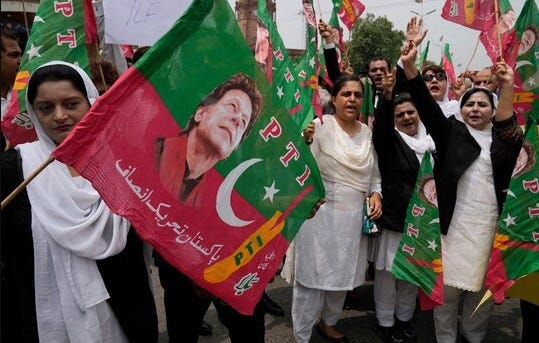
The enduring adage regarding Pakistan traces its origins back to 18th-century Prussia. The progenitor of the German state was famously characterized by a French statesman as not a country with an army, but an army with a country. This underscored the paramount role of the military in Prussian society and the significant allocation of public funds to the armed forces.
Fast-forwarding centuries, a similar axiom is applied to the South Asian nation: While most countries possess armies, in Pakistan, it appears that the army possesses the state. This assertion finds substantiation not only in the periodic coups orchestrated by Pakistani generals across decades but also in the extensive network of economic interests overseen by the military. The top brass wields overwhelming influence at nearly every juncture of Pakistan’s uneven pursuit of civilian-led democracy.
Around a decade ago, Pakistan witnessed its initial peaceful transition of democratic governance, sparking some optimism among analysts that the military was gradually receding into the backdrop of the country’s political landscape. However, this optimism proved fleeting, and recent events have accentuated how the military still seems to exert significant control, if not outright dominance. The military establishment continues to play a pivotal role, frequently intervening against elected officials who fall out of favor.
Former Prime Minister Imran Khan was apprehended by Pakistani authorities on Saturday following a court ruling that sentenced him to three years in prison for corruption charges. These charges revolved around concealing assets acquired from state gifts during his tenure. Khan’s advocates protested his detention in a remote and substandard facility, arguing that it was undignified for a figure of his stature. Khan and his supporters view his conviction and imprisonment as a blatant instance of political meddling aimed at obstructing his participation in upcoming elections later this year. In anticipation of these elections, the dissolution of Pakistan’s Parliament is anticipated later this week.
This sequence of events is heavily influenced by the military’s shadow. Imran Khan, a former national cricket hero turned populist agitator, initially operated on the fringes of Pakistan’s political realm. However, he and his party, the Movement for Justice (known by its Urdu acronym PTI), managed to break into the mainstream during the first half of the decade. It is widely believed that elements within the military facilitated Khan’s rise, as he lauded the armed forces while denouncing the perceived corruption and decadence of the country’s entrenched civilian political elite.
This dynamic shifted after PTI narrowly clinched victory in the 2018 elections and Khan assumed office. His grand vision of constructing an Islamic welfare state collided with the complex realities of a politically divided nation, perennially teetering on the brink of fiscal crisis. Despite his status as a revered figure among his supporters, Khan faced criticism from detractors who labeled him a demagogue and potential authoritarian leader. They accused him of vilifying political adversaries and mismanaging the country’s affairs.
In April 2022, Khan was ousted from power through a no-confidence vote in Parliament, likely backed tacitly by the military, which had lost confidence in his leadership. In the lead-up to his removal, Khan clashed with military leadership over key army appointments and faced accusations that his government was failing to address soaring inflation and debt. Furthermore, differences emerged between Khan and the military on foreign policy matters. Khan’s allegations of a conspiracy involving the U.S. government and Pakistani opposition strained his relationship with the military leadership, which sought to maintain a functional rapport with the United States.
Subsequently, Khan became entangled in a slew of legal cases against him. In May, following his initial arrest, fervent PTI supporters launched attacks on various military installations, perceiving the military establishment as the source of their leader’s tribulations.
The military’s response has been unyielding. Numerous PTI supporters have been detained, with some facing trial in military courts. Many PTI politicians, apprehensive of arrest, abandoned the party, while others defected to alternative factions and condemned Khan’s actions. Sympathetic voices in the media either went silent or were silenced. Political analyst Arif Rafiq described this as a form of political manipulation by the Pakistani Army, orchestrating resignations within Khan’s party and orchestrating new political alliances. The ultimate objective seems to be sidelining Khan from the political sphere, as his growing popular support has endowed him with political influence independent of the military.
Khan’s distinct brand of politics, along with his popularity, potentially renders him a distinctive challenge to the top echelons of the military. Once seen as a proxy of the army, he has now emerged as an independent force challenging the military’s institutional cohesion by sowing discord among its ranks, particularly against the army chief. The military might also harbor concerns that Khan’s main support base lies within Punjab, Pakistan’s largest province and a traditional recruiting ground for the army, populated by the pro-military urban middle class. Khan’s open defiance persisted for months. Shortly before his recent arrest, he openly criticized the military on BBC’s HARDtalk program, stating, “The country has been taken over by fascists, and they are petrified of elections… dismantling a democracy.” While his supporters view this as an accurate portrayal, many critics draw parallels between Khan and other prominent politicians like Nawaz Sharif and Benazir Bhutto, who, despite their earlier opposition to the military, eventually became entangled in legal and political struggles against the military establishment.
The unfolding situation highlights a complex interplay of power dynamics in Pakistan, where the military’s influence continues to play a decisive role in shaping the political landscape. As the nation grapples with these challenges, the fate of democracy remains uncertain, with debates over the extent to which external interference shapes the course of political events and the potential repercussions for the social fabric of the country.